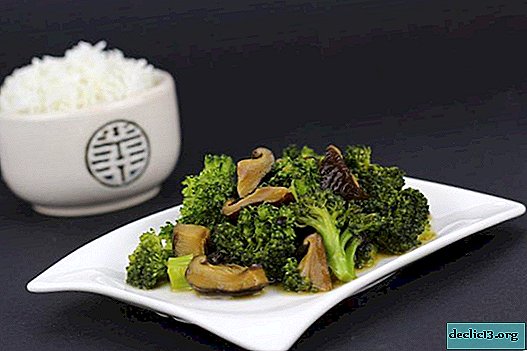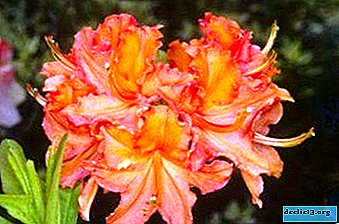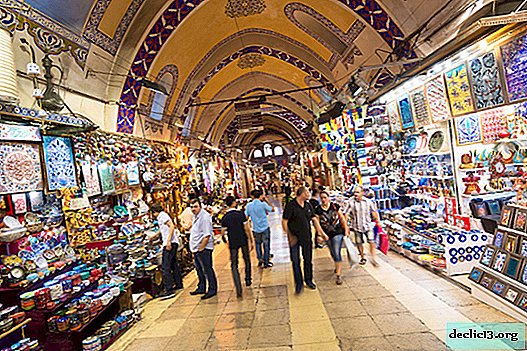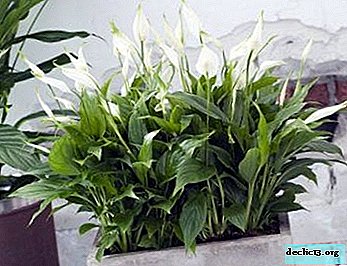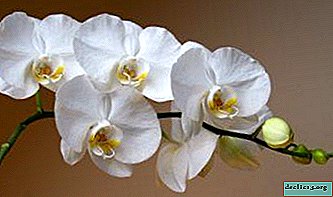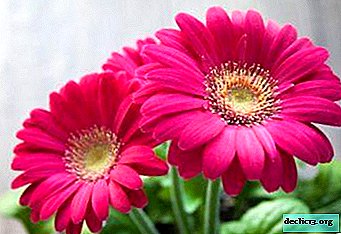Traditional Turkish drink with a unique aroma - pomegranate tea: benefits and harms, preparation
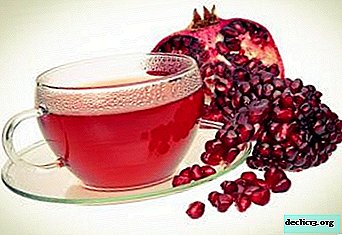
Pomegranate is revered not only in the countries of the East where it grows, but also among the inhabitants of Russia, who monitor their health, or who simply love to enjoy fruit with delicious taste.
It is confirmed that in addition to gastronomic pleasure, the use of pomegranate brings real benefits to the body, especially in the form of tea made from various parts of this fruit, for example, from flowers, but can also be harmful if used improperly.
What is useful?
The use of pomegranate tea, in the norms recommended by recipes, can have a beneficial effect on the state of the body, helping to get rid of toxins, toxins and radionuclides. Pomegranate tea also enhances metabolism, increases resistance to various infections by maintaining immunity, raises hemoglobin and normalizes the blood formation process.
Tea can be consumed as a prophylactic. from the formation of malignant tumors of the mammary glands and diseases of the gastrointestinal tract. The drink has a beneficial effect on the state of the nervous system, skin and hair, strengthens the heart muscle, stabilizes blood pressure and prevents the development of atherosclerosis.
Chemical composition and nutritional value
Pomegranate tea contains elements indispensable for the human body.
Important! Numerical values are based on 100 grams of product.- Acids: boric, apple, amber, lemon, wine and sorrel.
- Vitamins: B1 - 0.04 mg, B2 - 0.01 mg, B6 - 0.5 mg, B15 - 0.54 mg, C - 4 mg, PP - 0.5 mg.
- Trace elements: phosphorus - 8 mg, chromium - 2 mg, manganese - 1 mg, potassium - 150 mg, calcium - 10 mg, magnesium - 2 mg; iron - 1 mg.
- Amino acids:
- six irreplaceable - valine - 0,062 g; histidine - 0.030 g; leucine 0.065 g; lysine - 0.014 g; threonine - 0.031g; phenylalanine - 0, 046g;
- and nine interchangeable - alanine - 0,045; arginine - 0.045g; aspartic acid - 0.053; glycine - 0.064; glutamic acid - 0.051 g; serine - 0.040g; tyrosine - 0.034 g; cystine - 0.026g, proline - 0.010g.
The nutritional value:
- proteins - 0.7 g;
- fats - 0.6 g;
- carbohydrates - 14.5 g.
Calorie content is 72 kcal.
What diseases is it used for?
In complex therapy, pomegranate tea is useful for the following ailments:
 inflammatory processes in the organs of vision and hearing, as well as the kidneys and liver;
inflammatory processes in the organs of vision and hearing, as well as the kidneys and liver;- joint inflammation;
- angina;
- pharyngitis;
- stomatitis;
- gingivitis;
- pain symptoms during menstruation and during menopause.
Can it do harm?
- Given that pomegranate contains a large amount of acid, which when brewed turns into tea, its use is contraindicated for people suffering from diseases of the gastrointestinal tract such as gastritis with high acidity and peptic ulcer.
- Caution should be used for those who have problems associated with the rectum, for example, a violation of its integrity, hemorrhoids or constipation. Pomegranate has an astringent property, and you need to follow the individual reaction of the body.
- Individual intolerance involves the careful use of a product from flowers, grains or pomegranate juice, since in this case, instead of revealing its useful properties, pomegranate tea can be harmful.
- For children under one year old, pomegranate tea is strictly contraindicated.
- Pregnant women and nursing mothers can drink after consultation with a doctor.
Pomegranate drink preparation: step by step instructions
Of flowers
 Take pomegranate buds and leaves in equal quantities.
Take pomegranate buds and leaves in equal quantities.- Pour a teaspoon of the mixture into 250 ml of hot water.
- Cover the container with a lid and leave for 15-20 minutes.
- Strain.
Drink like regular tea. It can be supplemented with sugar or honey to taste.
From grains
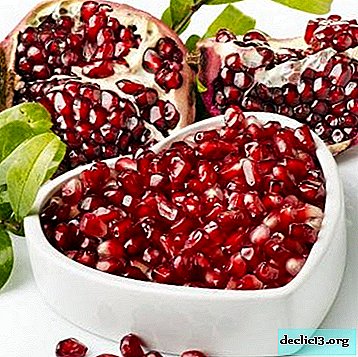 The drink is prepared in a water bath, when two teapots are placed on top of each other, the lower one is heated.
The drink is prepared in a water bath, when two teapots are placed on top of each other, the lower one is heated.- The bottom kettle is filled with purified water.
- In the top put the leaves of black tea and pomegranate seeds, in the proportion of one teaspoon of pomegranate seeds per 50 grams of leaves.
- The mixture is poured with boiled water.
- The bottom kettle is refilled.
- After boiling, the drink should be infused for five to seven minutes.
They use the resulting composition like regular tea, with lemon, lime, mint or cinnamon being a particularly good addition to it. The combination of the drink with honey and sugar is specifictherefore it is better to try a small portion first.
From juice
 This option is considered the easiest way to get pomegranate tea. Cooking occurs as follows:
This option is considered the easiest way to get pomegranate tea. Cooking occurs as follows:
- Black or green tea is brewed in the usual way.
- If desired, add honey or sugar.
- Cool the drink to room temperature.
- Mix it with pomegranate juice in a ratio of 1: 1. The ratio can be adjusted according to personal taste.
Can I buy in a store?
Pomegranate tea can be purchased both in online stores and offline. When buying, it is worth paying attention to the fact that pomegranate tea is not always called compounds with its pieces or flowers. The smell of pomegranate tea is often given by the flavor. Such a drink will not bring harm, but it will not be possible to get the expected benefits.
Natural raw pomegranate contains brands of teas:
- Stash tea - green tea with pomegranate flowers and raspberry slices.
- Steep - green tea with fruit extract.
The price in Moscow and St. Petersburg ranges from 230-280 rubles per 100 grams.
Traditional turkish drink
 Pomegranate tea is a traditional Turkish drink. Turkish tea can be in several ways:
Pomegranate tea is a traditional Turkish drink. Turkish tea can be in several ways:
- Tea raw materials mixed with parts of the fruit or its flowers.
- Tea-pomegranate soluble powder, which is made exclusively from natural ingredients. This concentrate includes:
- tea;
- dry grated pomegranate with peel;
- partitions and bones.
Before buying, you must read the composition so as not to purchase an imitation of pomegranate tea obtained with the help of flavors and dyes.
Attention! Turkish pomegranates, which are used to prepare concentrated powder, are processed without the use of preservatives. Bones and partitions give the drink additional healing properties due to the content of flavonoids, phytoncides and antioxidants in them.If the plans do not mean a visit to Turkey, this does not mean that you need to forget about real Turkish tea. It can easily be purchased in specialized online stores or in tea shops, it is quite affordable. One hundred grams of pomegranate tea in Moscow will cost about 130-150 rubles and 110-140 rubles in St. Petersburg.
How to distinguish from hibiscus?
Pomegranate tea and hibiscus tea are a little similar in taste - both drinks have acidity and a rich ruby color. You can visually distinguish one composition from another in dry form. Hibiscus is a dried hibiscus petal.
Only one cup of pomegranate tea per day is able to perfectly maintain the body in good shape, preserving youth and beautydefeating various ailments. You just need to choose the right recipe and enjoy the amazing taste of the drink, feeling its healing power.

 inflammatory processes in the organs of vision and hearing, as well as the kidneys and liver;
inflammatory processes in the organs of vision and hearing, as well as the kidneys and liver; Take pomegranate buds and leaves in equal quantities.
Take pomegranate buds and leaves in equal quantities. The drink is prepared in a water bath, when two teapots are placed on top of each other, the lower one is heated.
The drink is prepared in a water bath, when two teapots are placed on top of each other, the lower one is heated.

